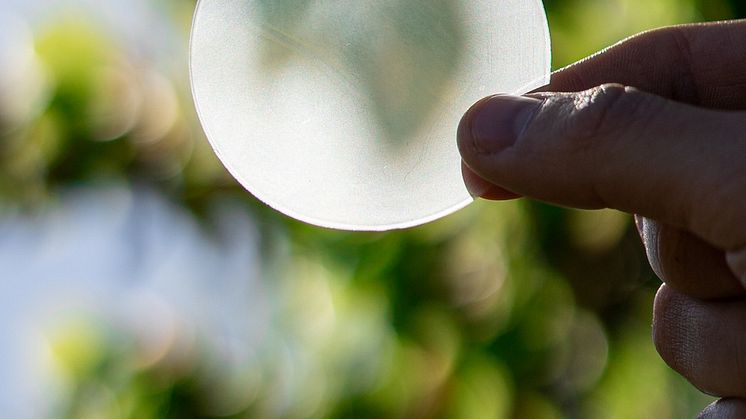
Pressmeddelande -
Cellfion paving the way towards a sustainable energy transition
The cleantech startup Cellfion celebrates its first anniversary by securing financing to enable the next steps towards the commercialization of the world’s first biobased membrane.
The transition to replace fossil fuels with renewable, green energy has been moving at an unprecedented rate in the last decade. However, the expansion of the renewable energy industry doesn’t come without its challenges - especially where energy storage is concerned. Intermittent renewable energy, such as wind and solar, require a means of storing energy, since the sun isn’t always shining and the wind isn’t always blowing. Rapidly emerging technologies in the form of Redox Flow Batteries and hydrogen can provide the perfect solution, where energy can be stored and discharged upon demand. Cellfion is here to enable these solutions and ensure sustainability with their unique biobased membranes.
The unique characteristics and raw materials of Cellfion’s membrane is what sets them apart in today's market. Cellfion’s technology is made from the most abundant biopolymer on the planet, cellulose, derived from wood. By extracting cellulose nano fibrils from wood, and modifying the surfaces, the fibrils can be fabricated into sheets of membranes that can be used as critical components in energy storage and conversion devices, such as Redox Flow Batteries and fuel cells. The fact that Cellfion’s membranes are made from an abundant forest material makes them not only sustainable, but also cost-effective.
To the best of our knowledge and extensive research- we are the first company working towards the commercialization of biobased membranes with no toxic substances at all, says Liam Hardey, CEO of Cellfion and Forbes 30 under 30 2022 nominee.
State-of-the-art commercial membranes are often made from PFAS-based substances, a substance the EU Commission will put restrictions on during 2023. With these restrictions, the need for alternative membranes is expected to grow massively, and impact start-up Cellfion aims to be at the forefront of this movement.
Cellfion stems from 10 years of research at KTH Royal Institute of Sweden, Linköping University and RISE. When taking the steps from research to a commercial product, it's important to surround the company with good partners that are long-term and believe in the company’s mission. Cellfion has now secured a seed investment of 14 million SEK from Almi Invest Green Tech, Voima Ventures, Klimatet Invest, LiU Invest and KTH Holding.
With our investment in Cellfion, we drive the development of an innovative material for energy storage solutions that enables the transition to renewable energy and thereby reduces greenhouse gas emissions, says Karin Edström, Investment Manager at Almi Invest GreenTech. With their bio-based membrane, which is both cost-effective and more tunable than today's commercial membrane, Cellfion has a strong position to enter the market.
This is what deep tech investing is all about, solving big problems that really matters. There are huge amounts of energy that are being lost from renewable energy sources due to the limitations of energy storage. Membranes is of the most crucial components to reach high efficiency. With an ambition to replace toxic and fossilbased membranes, the potential for Cellfion is huge. Additionally, the accelerating energy crisis makes the demand for sustainable solutions greater than ever, and Cellfion has the potential of becoming the new market leader, states Jenny Engerfelt, Investment Director at Voima Ventures.
The equity injection enables Cellfion to continue the development towards being a scalable manufacturer of sustainable membranes. In the coming years, the company plans to expand their team, begin their rapid prototyping by working with customers and partners, and focus on getting their first product to market.
Cellfion’s ambition is to create the most innovative, scalable and sustainable materials for green energy devices.
If the clean energy industry is to become sustainable, we need to ensure that the materials we are using are also truly sustainable, says Magnus Wikström, Director of Board at Cellfion.
For more information:
Liam Hardey, CEO of Cellfion.
Tel: +46704508083
Email: liam.hardey@cellfion.se
Alexandra Troulioti, Communications and marketing manager,
Tel: +46709838506
Email: alexandra.troulioti@cellfion.se
About Cellfion
Research at KTH, LiU and RISE combined cellulose fiber knowledge with electrochemistry and as a result, Cellfion was born as a company in august 2021. The research combined cellulose fiber knowledge with electrochemistry and as a result, Cellfion was born as a company in august 2021 and Liam Hardey became its’ CEO. The company is based in Norrköping but has recently moved into its new headquarters in Stockholm. Today Cellfion consists of 4 team members and a board of advisors and researchers with long experience in the field.
About Voima Ventures
Voima Ventures is a deep tech fund that invests purely in startups with a background in deep tech and science. Voima Ventures’ mission is to solve major global problems by combining science, entrepreneurship, and capital. Voima Ventures’ industry domains include bio and new materials, medical technologies and life sciences, imaging and optics, IoT and electronics, robotics, software & ICT and AI. In addition, Voima Ventures is managing a portfolio of VTT Ventures with 20 prominent deep tech companies including Solar Foods, Paptic, and Dispelix. Cornerstone investors include VTT Technical Research Centre of Finland and European Investment Fund (EIF), backed by Finnish private and institutional investors.
Ämnen
Regioner
LEAD är en av Sveriges bästa företagsinkubator som hjälper entreprenörer att bygga bolag snabbare och säkrare. Vi vänder oss till entreprenörer med företag som är innovativa och har potential att expandera. Verktygen för framgång baseras på en strukturerad och kvalitetssäkrad affärsutvecklingsmetodik som grundar sig på en nära och engagerad affärscoachning. LEAD ägs av Linköpings universitet och finansieras därutöver av Norrköping respektive Linköpings kommuner samt Vinnova.


